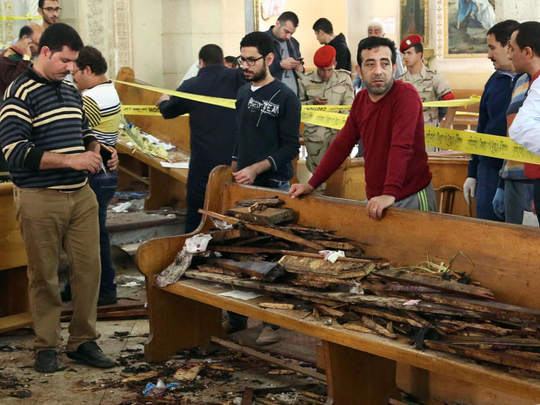
The terrorist attacks on Coptic churches in Egypt and the US missile strike on Shayrat airbase in Syria were the two topics that dominated headlines in the region.
The attacks on Coptic places of worship, besides wishing to spread fear and wreak havoc on the country, also aim to create deep divisions between Muslims and Christians in Egypt, said the Jordan Times.
“The attacks should remind all that the common enemy is Daesh (the self-proclaimed Islamic State of Iraq and the Levant) and its ilk, and that efforts must be channelled towards defeating them, not asserting the supremacy of a religion or belief. Only in an all-embracing society where ‘the other’ is accepted and religious hatred is criminalised can security and development happen. Laws in all Arab countries must criminalise all acts of hostility or hatred between the Muslim and Christian faiths, and against any faith or ethnicity, for that matter.”
The unconscionable attacks on Egyptian churches on Palm Sunday have proved once again that terrorism has no religion, and that it is an ideology of hate and a cult of death, said Lebanon’s Daily Star.
“When attacks such as Sunday’s appear, the holes in our policies against terrorism are so glaring that they might as well hit us in the face. To flush out these terrorists that live among us, all countries must come together. Not to condemn alone, or air grievances in the UN, which has become nothing more than an institution of bureaucracy. Rather, to share experience, information, materials and manpower, responding to terrorism before attacks happen, instead of after.”
The Syrian ordeal has reached its peak with the Syrian regime continuing its crimes against the Syrian people, a crime in which terrorist organisations are also taking part in, said the UAE’s Al Bayan.
“The US missile strike on the Syrian base reflects an international awakening towards the suffering of the Syrian people, and that is why the UAE and other Arab nations welcomed the missile strike, which will contribute to restoring balance in the region and put a stop to the Syrian regime’s crimes. The UAE has always declared that it is a people’s right to have a dignified life, and preserve their rights and life, and these are the basic components for evaluating the performance of nations.”
The attack on Shayrat airbase, although it was surprising and important, is a small step in changing the field condition and ending the Syrian tragedy, said the London-based Pan-Arab paper Asharq Al Awsat.
“Maybe, if the attack happened when Barack Obama threatened with the ‘red line’ in 2013 and before the Russian military intervention, then its influence might have been bigger — it might have contributed to supporting the opposition and putting huge pressure on Al Assad’s regime. As much as striking Shayrat airbase has achieved several goals, its influence will be limited with time if it remained a sole step and not a new strategy.”
Despite the fact that the US missile strike came way too late, it was the correct move, said Qatar’s Al Sharq.
“The Syrian regime bears the responsibility for all foreign military interventions in Syria after it carried out acts of genocide against its people, and refused to respond to their demands and their legitimate and peaceful aspirations. People of the Arab world are still waiting for the international community to shoulder their responsibility, and put an end to the regime’s crimes and use of internationally prohibited weapons, as well as finding a mechanism for bringing those who perpetrated these crimes to justice.”





_resources1_16a31069e4e_small.jpg)



